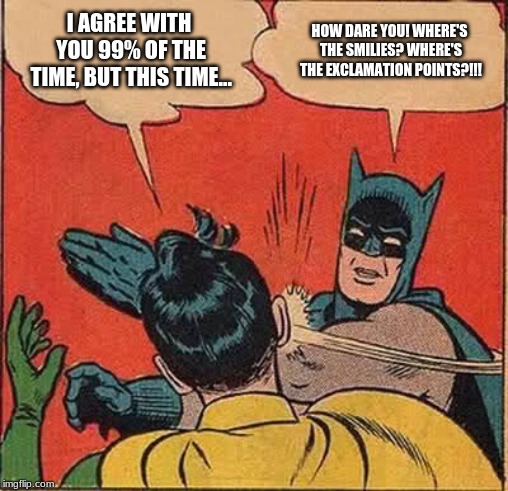

Since the early 90's, one thing I learned about communication over the internet, other than the fact that it's seriously flawed, is that everyone thinks that everything happens in a vacuum. They don't come with a common definition, so if you say the wrong thing, and you could be labeled racist/sexist, etc... You like Reggae, you say? Well that's cultural appropriation! You disagree with my political/religious views? That's bigotry and hatred and oppressive! So, if you are thinking I'm blaming one side over the other; you're wrong. This isn't about sides; all sides do this. Rather, this is about communication.
Say something about a political party that a family member likes? Well, even if their religion uses expressions like "families are forever," their tolerance for family members that disagrees is, well, non-existent. Tolerance isn't something practices at all by those who claim to be the bearers of the magic of tollerancism... Whether it's left wing social justice warriors, or right wing religious folks; both preach tolerance, but both seem to be the most intolerant people I have ever come across. But hey, isn't this post about communication? Yes it is. Tolerance is part of it. If you can't tolerate someone's viewpoint, you can't communicate with them and learn from them; or get them to learn from you.
The sad thing is, this isn't the way it is in the real world, generally... At least not the world that I grew up in. When you disagree with someone OFFLINE, it usually lasts until the next topic. You often find something to agree on, and realize why friendship and family is more than a set of political and sociological perspectives. But with the internet being our primary source of communication, it is wreaking havoc on family relationships and friendships. In fact, there are new social norms that don't exist in the real world.
For example, exclamation point can get you into a fight. Don't use it on a positive statement, and someone might take your comment as negative. Say it on a matter of fact statement, and someone might take your comment as really negative. In fact, does anyone even know how to use exclamation points anymore?!!! Exactly. Don't get me started on smilies. If you don't add a smiley after telling someone something, or asking for something, you are in trouble! :-/
Say something about a political party that a family member likes? Well, even if their religion uses expressions like "families are forever," their tolerance for family members that disagrees is, well, non-existent. Tolerance isn't something practices at all by those who claim to be the bearers of the magic of tollerancism... Whether it's left wing social justice warriors, or right wing religious folks; both preach tolerance, but both seem to be the most intolerant people I have ever come across. But hey, isn't this post about communication? Yes it is. Tolerance is part of it. If you can't tolerate someone's viewpoint, you can't communicate with them and learn from them; or get them to learn from you.
The sad thing is, this isn't the way it is in the real world, generally... At least not the world that I grew up in. When you disagree with someone OFFLINE, it usually lasts until the next topic. You often find something to agree on, and realize why friendship and family is more than a set of political and sociological perspectives. But with the internet being our primary source of communication, it is wreaking havoc on family relationships and friendships. In fact, there are new social norms that don't exist in the real world.
For example, exclamation point can get you into a fight. Don't use it on a positive statement, and someone might take your comment as negative. Say it on a matter of fact statement, and someone might take your comment as really negative. In fact, does anyone even know how to use exclamation points anymore?!!! Exactly. Don't get me started on smilies. If you don't add a smiley after telling someone something, or asking for something, you are in trouble! :-/
